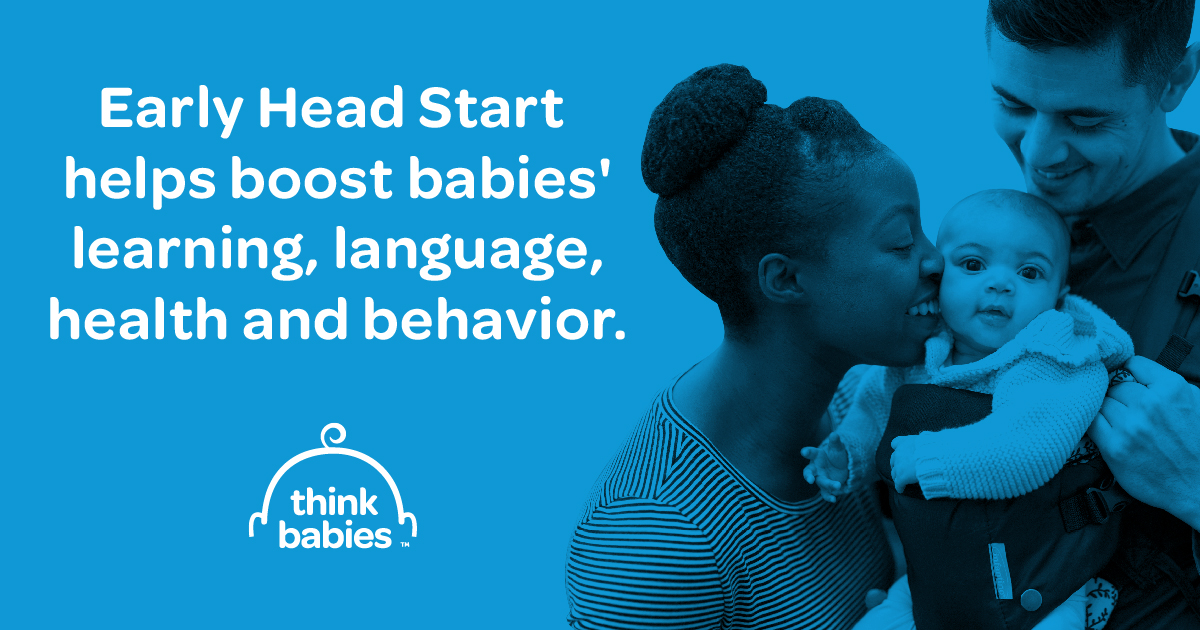5 Reasons Why Early Head Start Sets Children Up for Success

One Place provides several early education programs that support children through their first 2,000 days, including Early Head Start, a federally-funded program designed for low-income families. This foundational program helps families with children under the age of 3 promote school readiness, develop social-emotional growth, and ensure parents and caregivers have the tools they need to achieve their goals.
Learn more about how EHS differs from other early childhood education programs—and how it sets children up for a lifetime of success.
1. It supports a child’s social-emotional development.
The first 5 years of a child’s life are critical as their brain develops and new neural patterns are created—and studies show that children enrolled in EHS programs display significantly better social-emotional, language, and cognitive development skills.
By partnering with EHS during these formative years of a child’s life, parents and caregivers can nurture a child’s development, create stronger family bonds, and provide a healthy foundation for lifelong learning.
2. It keeps children healthier and happier.
Every child who enrolls in EHS starts the program with a developmental screening called Ages and Stages. This screening helps EHS staff determine how prepared a child is for school—and what tools and strategies might help them in the future. If a child needs additional developmental support, EHS will help families connect to vital services and referrals.
In addition to developmental screenings, children in EHS programs are often found to be healthier overall. One study found that enrollment in an EHS program resulted in increased preventative doctor visits as well as a higher rate of immunizations.
3. It results in better academic performance.
EHS uses a research-based curriculum that ensures teachers and caregivers have the tools they need to offer a positive, nurturing educational experience for children. The curriculum also gives educators the opportunity to be flexible and creative, tailoring the program to the unique needs of each child. When a teacher recognizes a child’s unique needs, the child develops trust and confidence, leading to healthy relationships.
Because EHS programs provide children with this solid foundation of social-emotional development, they are often well equipped to enter kindergarten and continue with their education. A 2002 study found that children who participated in EHS programs were more ready for kindergarten than children who did not attend EHS.
4. It benefits parents.
One of our favorite elements of EHS programs is parental engagement. When enrolled in an EHS program, parents receive comprehensive parenting support—so they can become the parents they want to be.
By learning critical parenting skills, parents in EHS programs are found to offer more stimulating home environments, read books more often with their children, use less physical punishment, and have higher levels of self-sufficiency.
5. Plus, it’s free for eligible families.
As a national, federally-funded program, Early Head Start is free and open to pregnant mothers, families, and caregivers who meet or fall below federal poverty income levels. EHS programs also reserve at least 10 percent of enrollment for children with disabilities.
Eligibility is based on income at or below the poverty level, however, families in other situations—such as homelessness, children in foster care, or if you receive Supplemental Security Income (SSI) or Temporary Assistance for Needy Families (TANF)—are also eligible.
Learn More
If you’re a parent or caregiver in Onslow County interested in Early Head Start programs, click here to learn more about our Early Head Start programs. Any questions? Reach out to us directly at caron.schienle@oneplaceonslow.org
Sources
- https://www.acf.hhs.gov/sites/default/files/documents/opre/impacts_vol1.pdfhttps://www.acf.hhs.gov/opre/report/making-difference-lives-infants-and-toddlers-and-their-families-impacts-early-head-2
- https://prekkid.org/parents/faqs/
- https://www.brookings.edu/research/the-long-term-impact-of-the-head-start-program/
- https://eclkc.ohs.acf.hhs.gov/programs/article/head-start-programs
- https://www.nhsa.org/why-head-start/why-it-matters/
- https://childcare.gov/consumer-education/head-start-and-early-head-start
- https://www.theclassroom.com/about-free-scholarship-money-for-preschool-13599996.html
- https://www.vox.com/future-perfect/2018/10/16/17928164/early-childhood-education-doesnt-teach-kids-fund-it
- https://www.nhsa.org/knowledge-center/center-for-policy-data-and-research/facts-and-impacts/#:~:text=Early%20Head%20Start%20children%20show,do%20not%20attend%20Head%20Start.
- https://www.easterseals.com/chicago/our-programs/childrens-services/head-start-program.html
- https://www.foodandsupplysource.com/4-primary-benefits-head-start-early-learning-program/
- https://www.chicagoparent.com/education/early-education/whole-family-benefits-from-head-start/
- https://www.zerotothree.org/resources/477-early-head-start-works
- https://eclkc.ohs.acf.hhs.gov/programs/article/early-head-start-benefits-children-families
- https://eclkc.ohs.acf.hhs.gov/programs/article/about-early-head-start-program#:~:text=Early%20Head%20Start%20programs%20promote,success%20in%20school%20and%20life.
